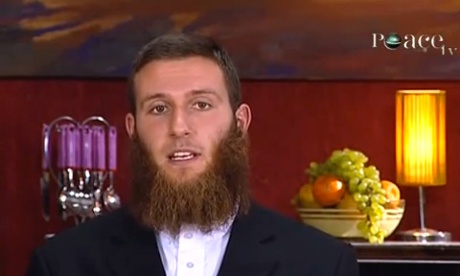
Since the start of the Syrian conflict, hundreds of men have left their homes in the west or elsewhere to join the country's civil war. Over the last 12 months, researchers at the International Centre for the Study of Radicalisation and Political Courage (ICSR) have created a database of the social media activity of 114 foreign fighters with Facebook or Twitter accounts.
The researchers were able to give a country-of-origin breakdown for their sample. The UK headed up the list, with 25.4% of fighters emanating from Britain.
When volunteers arrive in Syria, they join a variety of fighting groups. ICSR found that 61.4% of these fighters are affiliated with the Islamic State of Iraq and Sham (Isis), while 17.5% belong to Jabhat al-Nusrah, two of the most well-known groups in the fight against the Syrian president, Bashar Al-Assad.
Although it is a small sample, the team collected a list of 2,235 unique page names from the "likes" on 86 individual fighters' Facebook accounts. There were few connections between most pages – just over 80% were liked by just one fighter, but a very small minority (0.7%) were liked by at least 10%.
Shiv Malik writes:
The analysis identifies two relatively unknown clerics who have been acting as online cheerleaders for fighters seeking to topple President Bashar al-Assad. It also identifies a new breed of 'disseminators' advising and supporting the men and women who have joined rebel groups.
Two preachers, Ahmad Musa Jibril and Musa Cerantonio, were among the top 10 of Facebook pages that had been liked.
The only other individual preacher in this list is Sulaymaan al-Ulwan. Ulwan communicates only in Arabic and is currently incarcerated for breaching the terms of his release by preaching against the Saudi government. The report's authors put support for Ulwan down to admiration of his defiance rather than the western fighters following his teaching specifically.
They contrast Jibril and Cerantonio as follows:
Ahmad Musa Jibril and Musa Cerantonio – the two other preachers on the list – are both based in the west, speak English, and regularly communicate with western Muslim audiences through social media platforms. Their popularity is also reflected on Twitter, where they are followed by 60% and 23% of foreign fighters respectively.
It is also noted that the men's following does not indicate that they are recruiting members for either of the groups mentioned. The report's authors do argue, however, that it does mean that they are important spiritual figures for many of these foreign fighters.
More open data
Data journalism and data visualisations from the Guardian
Development and aid data
• Search the world’s global development data with our gateway
Can you do more with this data?
• Contact us at data@theguardian.com
• Follow us on Twitter
• Like us on Facebook

